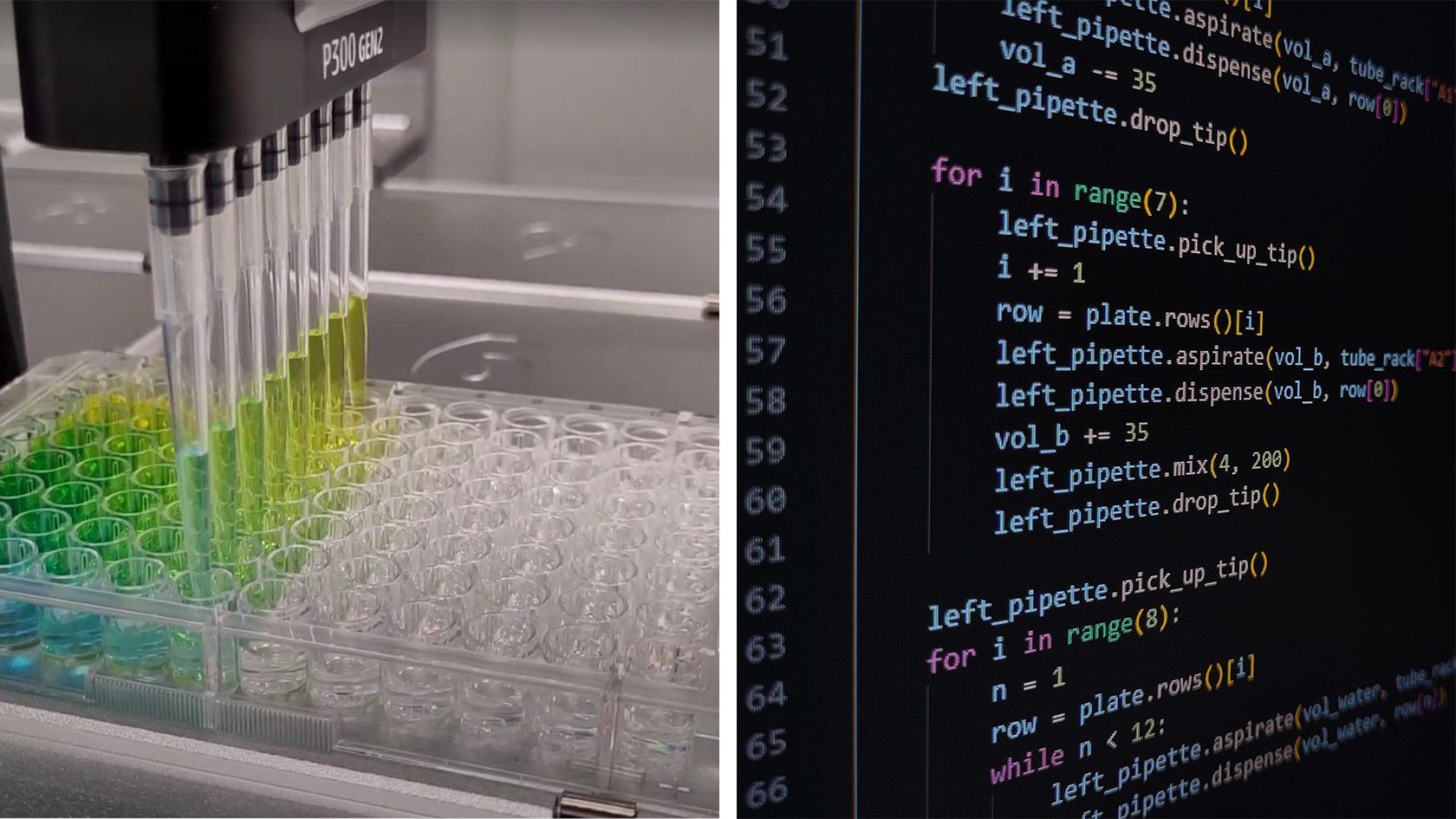Minor Lab Automation and Chemical Data Science
General information

Official roll-out of new minor study programme is going to be fall semester 2025. Students who have already accomplished courses of the minor can do the formal enrolment for fall semester 2025 and get previously completed modules recognised.
The minor “Lab Automation and Chemical Data Science” is available for bachelor and – as complementary minor – for master programmes.
The entire programme will be taught in English.
Why study Lab Automation and Chemical Data Science?
Automation, artificial intelligence and big data are already having a significant impact on today’s life sciences, both in industry and academia. These tools increasingly gain importance to accelerate research and development and to save precious resources – and the future labs in chemistry, biology, forensics, etc. cannot be imagined without them. The interdisciplinary minor programme “Lab Automation and Chemical Data Science” is aimed at teaching you to handle these new tools.
What am I going to learn in this minor study programme?
In this minor programme, you will apprehend the basics in Python and statistics. You will learn how to automate workflows, how to utilise instrumental analytics and how to work with robotic systems in the lab. You will be taught how to efficiently process, analyse and visualise big sets of scientific data, and how to employ artificial intelligence in the lab.
This will not only provide you with new ideas for your major study programme and your research, but will prepare you to encounter future challenges in various professions in the life sciences, which increasingly are leveraging lab automation and data science in their research and development.
Target group and requirements
The minor study programme “Lab Automation and Chemical Data Science” is open to all students who are interested in modern tools in a lab context. Thus, the minor is especially relevant for students of the Life Sciences, but can also serve as some practical experience for students in a data science major.
For most modules of the minor study programme, basic knowledge in chemistry – both theoretical and practical – is required (“CHE 170 Grundlagen der Chemie für die Life Sciences“ (only taught in German) and “CHE 171 Grundlagenpraktikum Chemie für die Life Sciences“ or equivalent modules. ). In consultation with the programme coordination, the electives contingent can be used for catching up on missing basics.
Extent and modules
The minor “Lab Automation and Chemical Data Science” comprises 30 ECTS credits, 22 of which are distributed over the five mandatory core modules that need to be accomplished:
| Semester | Modul | ECTS | Typ | Assess |
|---|---|---|---|---|
| 1 (HS) | DSA 101 Introduction to Data Analytics and Python | 4 | VU | ET |
| 2 (FS) | DSA 102 Lab Automation and Accelerated Chemistry | 6 | VU | ET |
| 3 (HS) | DSA 103 Advanced Chemical Data Science | 4 | VU | ET |
| 4 (FS) | DSA 104 AI and ML in Chemistry | 4 | VU | ET |
| 3/4 (HS/FS) | DSA 105 Automation and Data Science in Practice | 4 | PR | SA |
HS = Fall semester, FS = Spring semester, ECTS = European Credit Transfer System, VU = Lecture with integrated exercises, PR = Practical Training, Assess = Assessment, ET = end-term exam, SA = written report
Additionally, at least 8 ECTS credits have to be taken as elective modules, whose topic needs to be related to the central topics in the minor programme “Lab Automation and Chemical Data Science”. The elective modules will be chosen individually and in consultation with the programme coordination. A selection of suggestions for elective modules is listed below.
Suggestions for elective modules
| Course number | Module title | ECTS | Semester |
|---|---|---|---|
| 07SMCHE711 | CHE 711 Environmentally Safe Chemicals | 2 | HS |
| 07SMCHE747 | CHE 747 Introduction to Quantum Chemistry | 2 | FS |
| 07SMCHE748 | CHE 748 Computational Material Science & Advanced Quantum Science | 2 | FS |
| 07SMCHE717 | CHE 717 Perspektiven in forensischen Wissenschaften | 2 | HS |
| 07SMBIO134 | BIO 134 Programming in Biology | 5 | HS |
| 07SMBIO369 | BIO 369 An Introduction to Computer Programming and Agent-based Modelling using R | 2 | FS |
| 07SMBIO390 | BIO 390 Introduction to Bioinformatics | 3 | HS |
| 07SMBCH304 | BCH 304 Protein Biophysics | 6 | FS |
| 07SMBIO123 | BIO 123 Quantitative und Molekulare Systembiologie | 3 | FS |
| 07SMBIO254 | BIO 254 Functional Genomics | 3 | FS |
| 07SMPHY252 | PHY 252 Computergestütztes Experimentieren I | 3 | HS |
| 07SMPHY253 | PHY 253 Computergestütztes Experimentieren II | 3 | FS |
| 03SM22BI0004 | Software Construction | 6 | HS |
| 03SM22BI0009 | Database Systems | 4 | FS |
| 03SM22BI0008 | Data Visualization Concepts | 3 | FS |
Information and Advise
The responsible for content-related organisation, programme coordination and advice is
Dr. Johannes Schörgenhumer.
The responsible for all administrative aspects around the minor programme is Dr. Sabine Stockhause.